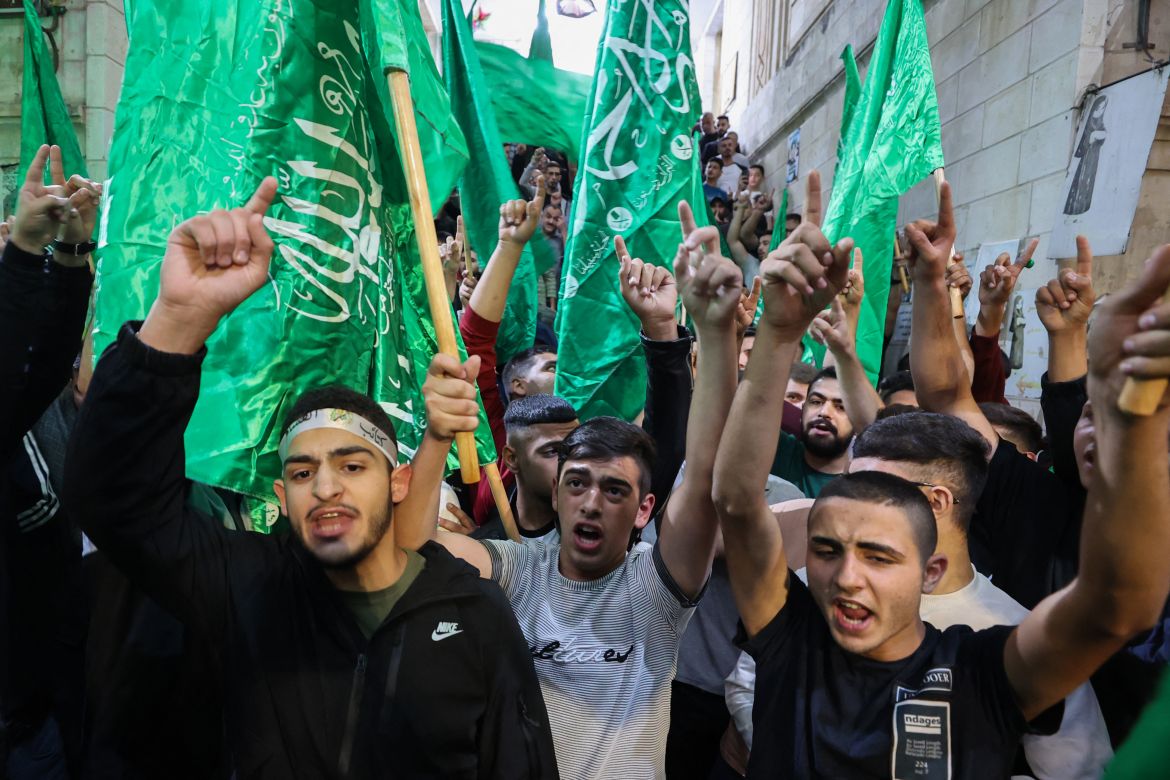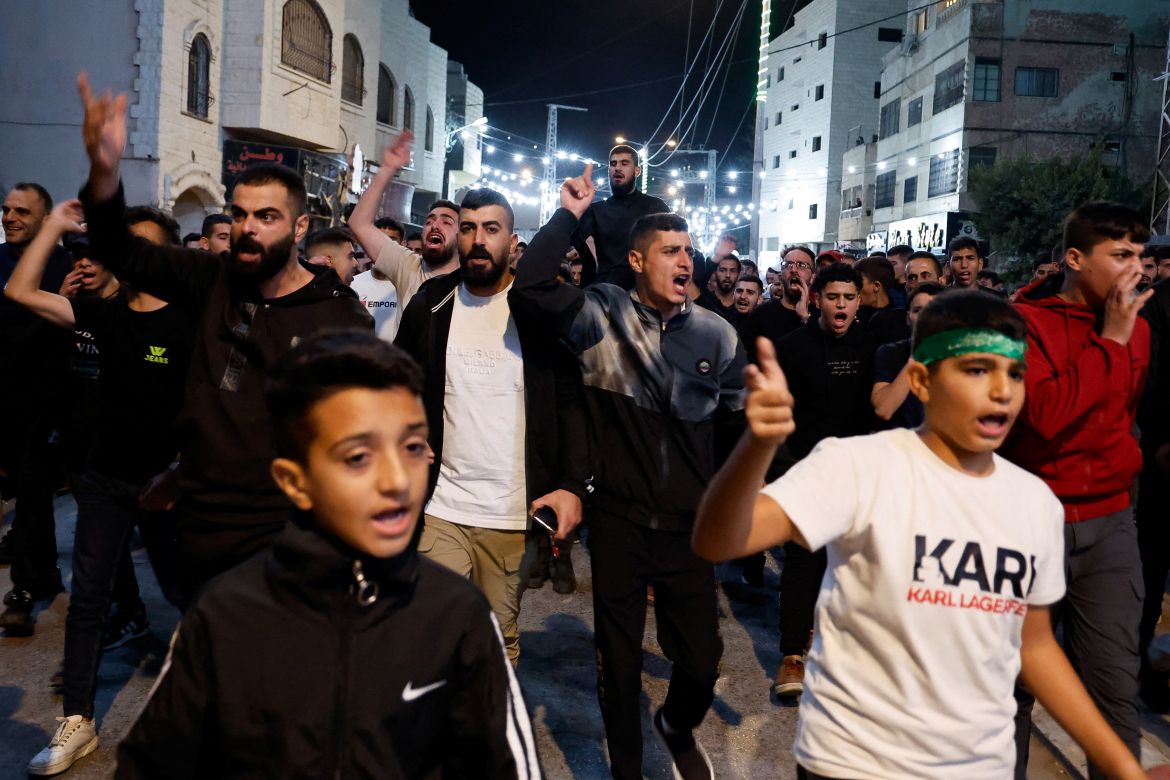Security forces in Ramallah have fired tear gas and stun grenades to disperse protesters rallying against Palestinian President Mahmoud Abbas, as popular anger boils over after a deadly Israeli attack on a Gaza hospital. Tuesday’s air strike on Al-Ahli al-Arabi Hospital is believed to be the single deadliest incident in Gaza since October 7. Authorities estimated it killed more than 500 people. The strike drew condemnation from across the world, and protests were staged at Israel’s embassies in Turkey and Jordan, as well as near the United States Embassy in Lebanon. Israel has denied responsibility for the attack, though it has led a continued bombing campaign throughout the Gaza Strip.
The Associated Press has the story:
Protesters took the streets in West Bank after Gaza Hospital blast
Newslooks- Ramallah (AP)
Security forces in Ramallah have fired tear gas and stun grenades to disperse protesters rallying against Palestinian President Mahmoud Abbas, as popular anger boils over after a deadly Israeli attack on a Gaza hospital.
Tuesday’s air strike on Al-Ahli al-Arabi Hospital is believed to be the single deadliest incident in Gaza since October 7. Authorities estimated it killed more than 500 people.

The strike drew condemnation from across the world, and protests were staged at Israel’s embassies in Turkey and Jordan, as well as near the United States Embassy in Lebanon. Israel has denied responsibility for the attack, though it has led a continued bombing campaign throughout the Gaza Strip.
Palestinian security forces fired tear gas and stun grenades to disperse protesters in the occupied West Bank city of Ramallah who were throwing rocks and chanting against Abbas as popular anger boiled.

Television footage showed protests in Yemen’s southwestern city of Taz, as well as in the Moroccan capital Rabat and Iraq’s capital, Baghdad.
Abbas cancelled a planned meeting in Jordan with US President Joe Biden on Tuesday, in protest of the hospital bombardment and other attacks.
But as he returned to the West Bank, Abbas was greeted by hundreds of demonstrators marching in Ramallah’s central Manara Square to express frustration with the Palestinian Authority. Some chanted in support of Hamas leaders. Others threw rocks.
Clashes with Palestinian security forces also broke out in the West Bank cities of Nablus, Tubas and Jenin, a northern city that was the focus of major Israeli military operations earlier this year, according to witnesses.
Lebanon’s Iran-backed Hezbollah militant group denounced what the blast and said was Israel’s deadly attack on the Al-Ahli al-Arabi hospital in Gaza, which is run by the Anglican church, and called for “a day of unprecedented anger” against Israel and Biden’s visit.

Ambulances and private cars rushed some 350 casualties from the al-Ahli blast to Gaza City’s main hospital, al-Shifa, which was already overwhelmed with wounded from other strikes, said its director, Mohammed Abu Selmia. The wounded were laid onto bloody floors, screaming in pain.
“We are squeezing five beds into a single tiny room. We need equipment, we need medicine, we need beds, we need anesthesia, we need everything,” Abu Selmia said, warning that the fuel supply for the hospital’s generators will run out Wednesday. “I think Gaza’s medical sector will collapse within hours.”

Before the al-Alhi Hospital deaths, Israeli strikes on Gaza killed at least 2,778 people and wounded 9,700, according to the Gaza Health Ministry. Nearly two-thirds of those killed were children, a ministry official said. Another 1,200 people across Gaza are believed to be buried under the rubble, alive or dead, health authorities said.
Hamas’ Oct. 7, attack in southern Israel killed more than 1,400 people, mostly civilians, and took some 200 captive into Gaza. Hamas militants in Gaza have launched rockets every day since, aiming at cities across Israel.
In protest over the purported airstrike, Palestinian President Mahmoud Abbas canceled his participation in a meeting with Biden, Jordan’s King Abdullah II and Egypt’s president set for Wednesday in Amman, Jordan to discuss the war. Abbas’ Palestinian Authority runs parts of the West Bank.

Protesters lift flags representing the Palestinian group Hamas as they protest in Nablus city in the occupied West Bank.
Later, Jordan’s foreign minister told state-run television that Jordan had canceled the summit, saying that the war between Israel and Hamas was “pushing the region to the brink.” He said the meeting would be postponed.
The comments emerged as Biden boarded the plane for his Mideast trip. Reporters shouted questions at him about the Jordan summit, but Biden did not answer.
Hundreds of Palestinians flooded the streets of major West Bank cities including Ramallah, the seat of the Palestinian Authority, where protesters hurled stones at Palestinian security forces who fired back with stun grenades. Others threw stones at Israeli checkpoints, where soldiers killed one Palestinian, West Bank authorities said. Hundreds of people joined protests that erupted in Beirut and Amman, where an angry crowd gathered outside the Israeli Embassy.

Biden’s visit in part aims to prevent the war from sparking a broader regional conflict. Violence flared Tuesday along Israel’s border with Lebanon, where Iranian-backed Hezbollah militants operate and where Israel has evacuated nearby towns.
With tens of thousands of troops massed along the border, Israel has been expected to launch a ground invasion into Gaza, but its plans remained uncertain.
“We are preparing for the next stages of war,” military spokesman Lt. Col. Richard Hecht said. “We haven’t said what they will be. Everybody’s talking about a ground offensive. It might be something different.”
Throughout the day Tuesday, airstrikes killed dozens of civilians and at least one senior Hamas figure in the southern half of the Gaza Strip, where the Israeli military told fleeing Palestinians to go. An Associated Press reporter saw around 50 bodies brought to Nasser Hospital after strikes in the southern city of Khan Younis.

Palestinians rally in Tubas, part of the Israeli-occupied West Bank, after the Israeli strike on the Gaza hospital.
An airstrike in Deir al Balah reduced a house to rubble, killing a man and 11 women and children inside and in a neighboring house, some of whom had evacuated from Gaza City. Witnesses said there was no warning before the strike.
Shelling from Israeli tanks hit a U.N. school in central Gaza where 4,000 Palestinians had taken refuge, killing six people and wounding dozens, the United Nations Palestinian refugee agency said. At least 24 U.N. installations have been hit the past week, killing at least 14 members of the agency’s staff.
The Israeli military said it was targeting Hamas hideouts, infrastructure and command centers.

A barrage of strikes crashed into the Bureij refugee camp in central Gaza, leveling an entire block of homes and causing dozens of casualties among families inside, residents said. Among those killed was one of Hamas’ top military commanders, Ayman Nofal, the group’s military wing said — the highest-profile militant known to have been killed so far in the war.
Nofal, formerly the intelligence chief of Hamas’ armed wing, was in charge of Hamas militant activities in the central Gaza Strip, including coordinating activities with other militant groups.
Israeli Prime Minister Benjamin Netanyahu sought to put the blame on Hamas for Israel’s retaliatory attacks and the rising civilian casualties in Gaza. “Not only is it targeting and murdering civilians with unprecedented savagery, it’s hiding behind civilians,” he said.

In Gaza City, Israeli airstrikes also hit the house of Hamas’ top political official, Ismail Haniyeh, killing at least 14 people. Haniyeh is based in Doha, Qatar, but his family lives in Gaza City. The Hamas media office did not immediately identify those killed.
With Israel barring entry of water, fuel and food into Gaza since Hamas’ brutal attack last week, U.S. Secretary of State Antony Blinken secured an agreement with Netanyahu to discuss creation of a mechanism for delivering aid to the territory’s 2.3 million people. U.S. officials said the gain might appear modest, but stressed that it was a significant step forward.

Still, as of late Tuesday, there was no deal in place. A top Israeli official said his country was demanding guarantees that Hamas militants would not seize any aid deliveries. Tzahi Hanegbi, head of Israel’s National Security Council, suggested entry of aid also depended on the return of hostages held by Hamas.
“The return of the hostages, which is sacred in our eyes, is a key component in any humanitarian efforts,” he told reporters, without elaborating.
ISLAMIC JIHAD GROUP DENIES RESPONSIBILITY FOR HOSPITAL BLAST
JERUSALEM — The Palestinain Islamic Jihad group denied Israel’s claim that it was behind the deadly blast at Al-Ahli hospital. It accused Israel of “trying hard to evade responsibility for the brutal massacre it committed.”

“The accusations promoted by the enemy are baseless,” Islamic Jihad said, adding that the group “does not use places of worship or public facilities, especially hospitals, as military centers or weapons stores.”
The group said details such as “the angle of the bomb’s fall and the extent of destruction it left behind” confirm it was similar to Israeli strikes.







